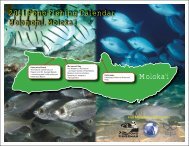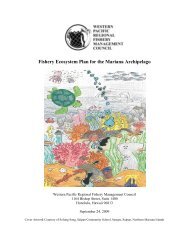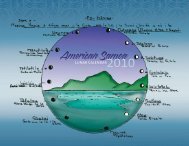Shark Depredation and Unwanted Bycatch in Pelagic Longline
Shark Depredation and Unwanted Bycatch in Pelagic Longline
Shark Depredation and Unwanted Bycatch in Pelagic Longline
You also want an ePaper? Increase the reach of your titles
YUMPU automatically turns print PDFs into web optimized ePapers that Google loves.
Chapter 4<br />
National <strong>and</strong> International Measures<br />
4.1. Summary <strong>and</strong> Effects of National/EC Legislation<br />
on <strong>Shark</strong> Interactions<br />
Table 4.1 summarizes legally b<strong>in</strong>d<strong>in</strong>g measures that <strong>in</strong>fluence<br />
longl<strong>in</strong>e <strong>in</strong>dustry practices <strong>and</strong> attitudes towards shark bycatch <strong>and</strong><br />
depredation <strong>in</strong> pelagic longl<strong>in</strong>e fisheries. The two Chile longl<strong>in</strong>e<br />
fisheries, Fiji longl<strong>in</strong>e fishery, <strong>and</strong> three Japan longl<strong>in</strong>e tuna fisheries are<br />
not subject to legally b<strong>in</strong>d<strong>in</strong>g measures that manage shark <strong>in</strong>teractions,<br />
<strong>and</strong> are not <strong>in</strong>cluded <strong>in</strong> Table 4.1. However, Japan <strong>and</strong> Fiji distant<br />
water longl<strong>in</strong>e tuna vessels may comply with voluntary measures<br />
adopted by Regional Fishery Management Organizations, <strong>and</strong><br />
vessels operat<strong>in</strong>g <strong>in</strong> EEZs of other nations through foreign license<br />
access agreements may be required to comply with restrictions on<br />
shark catch, retention <strong>and</strong> use under these access agreements.<br />
Legislation prohibit<strong>in</strong>g the removal of shark f<strong>in</strong>s <strong>and</strong> tail <strong>and</strong><br />
discard<strong>in</strong>g the rema<strong>in</strong>der of the shark at sea <strong>in</strong> pelagic longl<strong>in</strong>e<br />
fisheries exists <strong>in</strong> four of the eight countries <strong>in</strong>cluded <strong>in</strong> this study<br />
(Australia, Italy, South Africa, <strong>and</strong> U.S.A.) (Commonwealth of Australia,<br />
1991; South Africa Mar<strong>in</strong>e Liv<strong>in</strong>g Resource Act of 1998; U.S. Congress,<br />
2000; Council of the European Union, 2003). In the Australia longl<strong>in</strong>e<br />
tuna <strong>and</strong> billfish fishery, a rule that disallows possession, carry<strong>in</strong>g <strong>and</strong><br />
l<strong>and</strong><strong>in</strong>g of shark f<strong>in</strong>s unless attached to the trunk of the shark has likely<br />
substantially reduced shark fish<strong>in</strong>g mortality, as f<strong>in</strong>n<strong>in</strong>g was a widespread<br />
practice before this measure was <strong>in</strong>stituted, while about 75% of caught<br />
sharks are now released alive (Rose <strong>and</strong> McLaughl<strong>in</strong>, 2001; Hobday et al.,<br />
2004). In the Hawaii longl<strong>in</strong>e tuna <strong>and</strong> swordfish fisheries, observer data<br />
<strong>in</strong>dicate that the restriction on shark f<strong>in</strong>n<strong>in</strong>g, which requires the<br />
retention of shark carcasses for correspond<strong>in</strong>g reta<strong>in</strong>ed f<strong>in</strong>s, has<br />
likewise substantially reduced shark fish<strong>in</strong>g mortality. As many as<br />
76% <strong>and</strong> 64% of caught sharks were f<strong>in</strong>ned <strong>in</strong> the Hawaii tuna <strong>and</strong><br />
swordfish fisheries, respectively, prior to this rule be<strong>in</strong>g <strong>in</strong> effect,<br />
while <strong>in</strong> 2006 91% <strong>and</strong> 93% of caught sharks were released alive <strong>in</strong><br />
the tuna <strong>and</strong> swordfish fisheries, respectively. In the South Africa<br />
longl<strong>in</strong>e tuna <strong>and</strong> swordfish fishery, all <strong>in</strong>terviewed fishers stated<br />
that prior to the f<strong>in</strong>n<strong>in</strong>g restriction, they would f<strong>in</strong> <strong>and</strong> discard the<br />
carcass of all caught sharks exclud<strong>in</strong>g makos, which were reta<strong>in</strong>ed for<br />
the sale of both their f<strong>in</strong>s <strong>and</strong> meat. Thus, as <strong>in</strong> the case <strong>in</strong> the Hawaii<br />
<strong>and</strong> Australia longl<strong>in</strong>e fisheries, the restriction on f<strong>in</strong>n<strong>in</strong>g <strong>in</strong> South<br />
Africa has substantially reduced shark retention <strong>and</strong> <strong>in</strong>creased<br />
discards. In these fisheries, shark f<strong>in</strong>n<strong>in</strong>g restrictions have caused<br />
substantial reductions <strong>in</strong> revenue to <strong>in</strong>dustry. For <strong>in</strong>stance, revenue<br />
from shark f<strong>in</strong>s had comprised 10-11% of Hawaii longl<strong>in</strong>e crew salaries<br />
(McCoy <strong>and</strong> Ishihara, 1999).<br />
Italy is subject to European Union Council Regulation No. 1185<br />
(Council of the European Union, 2003), which prohibits the practice<br />
of shark f<strong>in</strong>n<strong>in</strong>g. However, all 17 <strong>in</strong>terviewed owner-operators from<br />
the Italy Mediterranean <strong>in</strong>dustrial longl<strong>in</strong>e swordfish fishery were<br />
unaware of the prohibition <strong>and</strong> thus the legislation does not affect<br />
their practices. However, no shark f<strong>in</strong>n<strong>in</strong>g is reported to occur <strong>in</strong> the<br />
fishery due to the lack of a local market for the f<strong>in</strong>s.<br />
Japan does not have legislation restrict<strong>in</strong>g shark f<strong>in</strong>n<strong>in</strong>g practices,<br />
however, the distant-water fleet fish <strong>in</strong> EEZs of nations that do have<br />
f<strong>in</strong>n<strong>in</strong>g restrictions (e.g., South Africa, Brazil, Costa Rica). Vessels<br />
<strong>in</strong> the Japan distant-water longl<strong>in</strong>e tuna fishery will likely f<strong>in</strong> caught<br />
sharks <strong>and</strong> discard the carcass unless they are fish<strong>in</strong>g <strong>in</strong> the EEZ of<br />
a nation that prohibits this practice, <strong>in</strong> which case the vessel may<br />
choose to reta<strong>in</strong> the whole shark carcass <strong>and</strong> l<strong>and</strong> the carcass <strong>in</strong> ports<br />
where there are markets for shark meat. Thus, Japanese longl<strong>in</strong>e<br />
fishermen have adapted to f<strong>in</strong>n<strong>in</strong>g regulations applicable <strong>in</strong> some<br />
areas by l<strong>and</strong><strong>in</strong>g sharks <strong>in</strong> recently developed local markets rather<br />
than by attempt<strong>in</strong>g to avoid shark <strong>in</strong>teractions. In waters without<br />
f<strong>in</strong>n<strong>in</strong>g regulations, <strong>in</strong>clud<strong>in</strong>g Japanese waters <strong>and</strong> the North Pacific,<br />
sharks are either f<strong>in</strong>ned or l<strong>and</strong>ed whole, <strong>and</strong> <strong>in</strong> either case the ability<br />
to sell shark products has contributed to a lack of <strong>in</strong>terest <strong>in</strong> reduc<strong>in</strong>g<br />
shark bycatch.<br />
A 20 shark carcass per trip limit for the retention of sharks <strong>in</strong> the<br />
Australia East coast longl<strong>in</strong>e tuna <strong>and</strong> billfish fishery has not altered<br />
the number of sharks reta<strong>in</strong>ed by fishers, as fewer than 20 sharks<br />
are typically caught dur<strong>in</strong>g an average length trip, <strong>and</strong> only a small<br />
proportion of the sharks caught on a trip are of species (makos<br />
15












